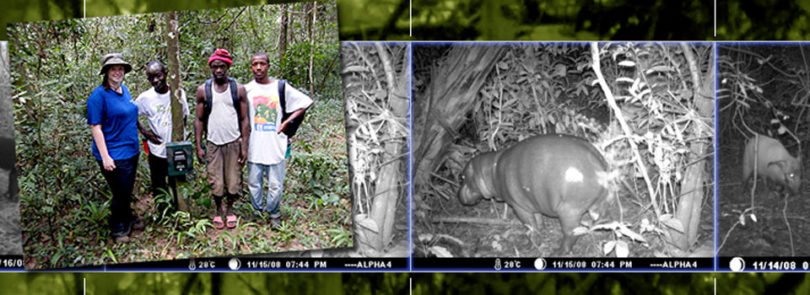April Conway went to Africa to study pygmy hippos. But she’s found more than just the rare, smaller cousin of the hippopotamus. She has captured photographs of a wide variety of species, ranging from common chimpanzees to endangered birds like white-breasted guinea fowls.
The UGA graduate student is in Sierra Leone during the dry season, from October to May setting up cameras on Tiwai Island as part of her efforts to find out where the pygmy hippos are and determine an accurate population estimate. She also will document their feeding habits, along with anything else that can lead to a greater understanding of the animals.
Since arriving on Tiwai Island, which is in the southeastern part of the country, Conway has photographed a variety of animals she never intended to find:
- The chimpanzee, which is endangered due to hunting and habitat loss. Although there are an estimated 30 chimps on Tiwai Island, Conway says there’s a lot of mystery surrounding their behavior and movements. They are often heard drumming, although no one knows what they are using;
- The white-breasted guinea fowl, listed as a vulnerable species. Conway’s cameras captured an image of these rare birds in one of the very few documentations of the species on Tiwai Island;
- And several species of forest antelope called duikers, which although fairly common, are heavily hunted and sold in the bushmeat trade.
Conway is using the same type of trail cameras often used by deer hunters to photograph the pygmy hippos, which are notoriously difficult to study in the wild. The cameras are digital and use infrared diodes to capture images instead of the visible light flash. She’s also using GPS to find random locations where the animals might happen by, working with two assistants chosen by local communities to help her.
Her research has proven to be difficult: To even get around, she has to use a machete to hack through dense vegetation, and the Moa River surrounding the island not only has swift-moving and crocodile-infested currents, but has many hidden boulders than can easily flip a canoe. She reaches her research locations through the use of hiking, motorboats and dugout canoes. She has also had trouble communicating with residents in her host country due to language barriers.
Conway, who is working at the Tiwai Island Research Station in the Pujehan District, is the first foreigner undertaking research there since the end of the civil war. Her work is being funded by Conservation International and the Tulsa Zoo and Living Museum Conservation Grants Program in collaboration with the Environmental Foundation for Africa, which is in charge of research at Tiwai Island. The World Conservation Union has estimated that there are about 3,000 pygmy hippos left in all of Africa, scattered among fragments of the once-widespread forests. Deforestation and hunting have been the main threats to the species.





